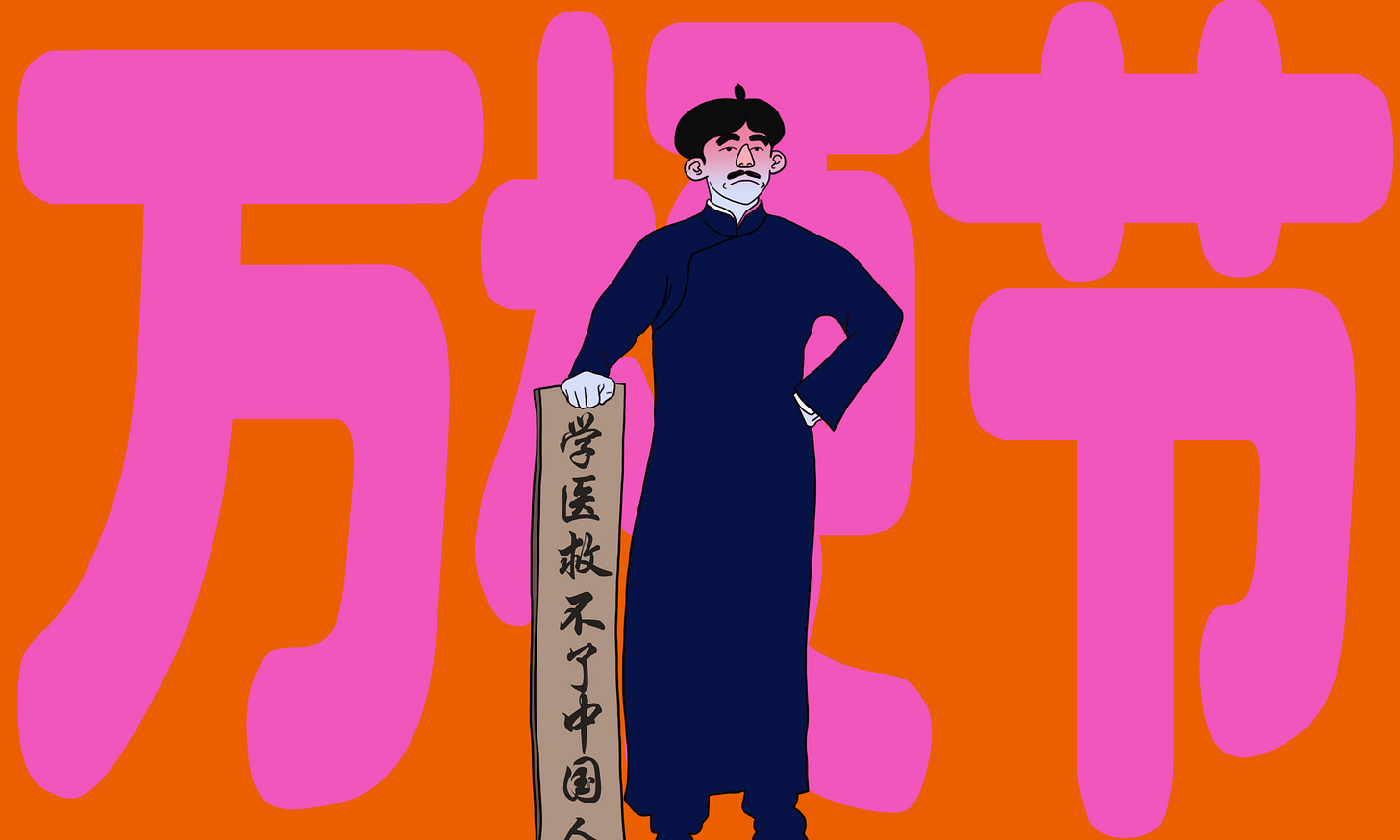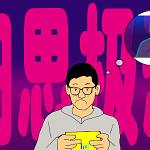Welcome to RealTime Mandarin—a multimedia resource to immerse you in the latest Chinese language trends, inspire you to practice and improve your Mandarin every week, and empower you to communicate with confidence.
Subscribe now to get the next issue straight to your inbox!
Young people gathered in Shanghai last weekend to celebrate Halloween.
Unlike Halloween in the West, there were no pumpkins or trick-or-treaters in sight.
Instead, revellers adapted the Western celebration into something different.
They dressed as famous Chinese public figures, celebrities, and historical characters, and in costumes that poked fun at the authorities.
The audacious costumes drew large crowds of spectators, and generated discussion on social media.
Comments highlighted the creativity on display:
If you let Shanghai celebrate Halloween, it will show you five thousand years of civilization in return.
你给上海一个万圣节,它还你人类五千年。
Others pointed towards how Halloween, a foreign import, has been re-appropriated as a festival with Chinese characteristics:
This year’s Shanghai Halloween is indeed like a cultural invasion, but in reverse.
今年的上海万圣节确实像文化入侵,不过是反向的。
The cosplaying of famous Chinese celebrities, and indulgence in meme culture, also led to a new phrase being created to describe the extravaganza:
With rich creativity and a dense display of internet memes, this Halloween has earned the name of "Ten-thousand Memes Festival".
创意之丰富、网络梗之密集,直接让这个万圣节被称为了“万梗节”。
“Ten thousand memes festival” (万梗节 wàngěngjié) is a play on words of Halloween in Chinese: 万圣节 wànshèngjié, which is a closer translation of All Saints' Day, a holy festival in the Christian calendar on 1 November.
The new phrase replaces the word for “Saint” (圣 shèng) with the character 梗 gěng which means “gag” or “joke”.
It’s also a meme: An image, video, or piece of text shared and spread rapidly online, often with slight variations but all with a humorous or slightly critical point to make.
The memes on display on the streets of Shanghai are so specific to Chinese history, culture and modern society, that you need to know the context to get the jokes.
Fortunately, for readers of this newsletter, we’ve discussed many of them here!
One standout costume was a man dressed as China’s Lipstick King, Lǐ Jiāqí 李佳琦, the cosmetics influencer, who was criticised earlier in the year when he suggested his fans should work harder to earn money rather than complain about how expensive products were. The impersonator’s shirt had the meme:
Austin Li is out of touch (哪李贵了 nǎlǐ guìle) which we discussed before in this newsletter.
Another young man dressed as Lǔ Xùn 鲁迅, China’s most famous twentieth-century writer and the source of many phrases and memes we’ve discussed before in this newsletter.
The 21st century parody of the author held a sign that read:
“Studying medicine won’t save the Chinese.”
学医救不了中国人。
It’s a reference to the writer’s youthful rejection of a career in medicine in favour of a life devoted to using his words to critique - and cure - the ills of society during the later years of imperial rule in China.
There was much more on show too:
Here, you can find "A-shares" and "Lu Xun"; you can also find film and television works and news events. All these images are originally not connected with each other and their emergence can span hundreds of years. But at this moment, they enter the same time and space, forming a colourful and varied platter, and a full-body scan of the spiritual world of contemporary Chinese. [1]
在这,你能看到“A股”,也能看到“鲁迅”;能看到影视作品,也能看到新闻事件。所有这些原本彼此绝缘的意象,彼此跨度可以超过上百年,在这一刻进入同一片时空,组成了拼盘,构成了对当代中国人精神世界的整体扫描。 [1]
So, that’s what we’re learning about this week!
Favourite Five
1. 苦闷 kǔ mèn
melancholy
他们是社畜、是打工人、是996,他们在公共舆论里的叙事,总带着某种悲情与苦闷 - They are corporate workers, working 996, and their narratives in the public discourse always carry a certain sense of melancholy. [1]
Related:
郁闷 yù mèn - depressed
枯寂 kū jì - desolate
痛楚 tòng chǔ - suffering
2. cos
cosplay
那英是今年的新晋cos巨星吗,上海几乎满大街都是 - Is Na Ying a new favourite for cosplayers this year? You can see her on almost every street in Shanghai. [3]
Note: Originally a popular trend from Japan, this has gained traction in China where people dress up as their favourite character from computer games, manga, and in this case celebrities.
3. 万梗节 wàn gěng jié
All Memes Festival
创意之丰富、网络梗之密集,直接让这个万圣节被称为了“万梗节” - With rich creativity and a dense display of internet memes, this Halloween has directly earned the name "All Memes Festival". [1]
Related:
洋节 yáng jié - a Western festival
鬼节 guǐ jié - Ghost festival - a traditional Chinese festival that happens in the seventh month of the lunar calendar when the dead are believed to come back to the human world. Big in rural parts of Taiwan especially.
4. 化夷为华 huà yí wéi huá
assimilate foreign culture into Chinese culture
要把它化成中国节才是名正言顺的,所谓的“化夷为华”或“洋为中用” - To turn it into a Chinese festival is the right and proper way, which can also be called "assimilate foreign culture into Chinese culture" or "adapt foreign things for Chinese use". [2]
Related:
洋为中用 yáng wéi zhōng yòng - Western things adapted for Chinese use
5. 文化入侵 wén huà rù qīn
cultural invasion
很多人都批评它: “低俗不堪”“有碍观瞻”“崇洋媚外”“文化入侵” - Many people criticise it as "vulgar and indecent", "detrimental to public morals", "blind admiration of foreign things", and "cultural invasion". [5]
Consuming the Conversation
Useful words
6. 出窍 chū qiào
out of body experience
现在上海过万圣节,一晃眼觉得自己出窍了 - When celebrating Halloween in Shanghai this year, I seemed to have an out-of-body experience. [3]
7. 乙方 yǐ fāng
Party B, service provider
万圣节扮相里的“乙方”,是日常生活的情感宣泄 - One cosplayer dressed up as the "service provider" to vent his emotions from the toil of everyday work.[2]
Note: They are cosplaying themselves as the “service provider”, the connotation is similar to “working people” 打工人.
8. 作妖 zuò yāo
do something outrageous; party and have fun
已经没有什么能阻止上海年轻人的作妖了 - Nothing can stop the young people of Shanghai from partying and having fun. [2]
Related:
妖界 yāo jiè - the underworld
9. 古怪 gǔ guài
peculiar
不过我看这席子下面着实有些古怪... - However, I can see something quite peculiar beneath the mat… [3]
Related:
搞怪 gǎo guài - funny, doing something unconventional or eccentric
10. 枷锁 jiā suǒ
shackles
枷锁没有东方和西方之异,但却有文明和野蛮之分 - Shackles know no distinction between East and West, but they do distinguish between civilization and barbarism. [4]
11. 宣泄 xuān xiè
vent
表达和宣泄一些情绪而已,完全用不着如此紧张 - They are just expressing and venting some emotions, so there's no need to be so tense about it. [5]
Three-character phrases
12. 绷不住 bēng bu zhù
can't help but burst into something; I can't even















